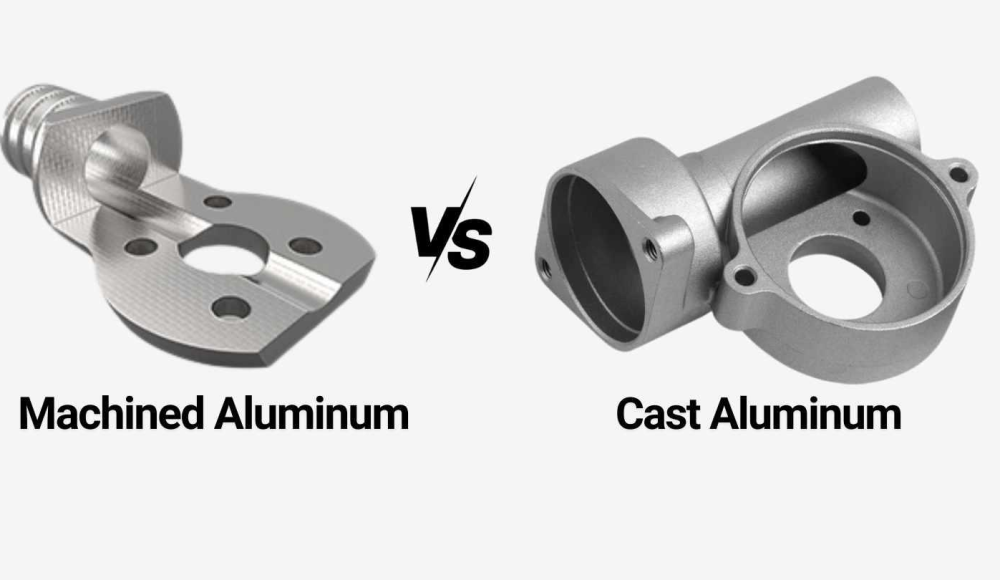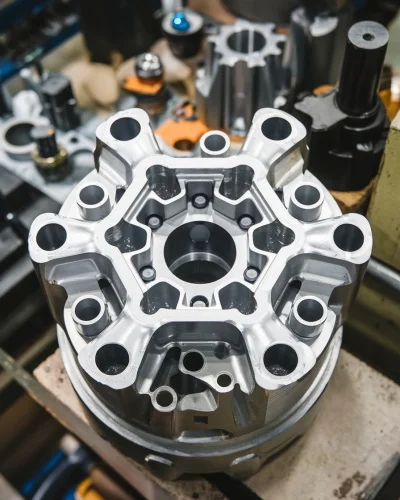Just How Aluminum Foundries Add To Different Industries: A Detailed Review
Light weight aluminum foundries serve as important suppliers across several markets, including automotive, aerospace, building, and electronics. They generate parts that are not just lightweight however also durable, improving the performance of numerous items. With innovative casting strategies and a commitment to sustainability, these shops are adapting to meet progressing industry needs. As they innovate, the influence of light weight aluminum castings on different applications increases vital concerns concerning the future of manufacturing. What lies in advance for this essential sector?
The Function of Light Weight Aluminum Foundries in the Automotive Market
As the automobile market progressively embraces light-weight materials to enhance gas performance and performance, light weight aluminum factories play an essential duty in this evolution. These facilities focus on the manufacturing of aluminum castings, which are necessary components in modern lorries. By supplying high-strength, lightweight parts, light weight aluminum foundries allow manufacturers to reduce the total weight of lorries, inevitably causing enhanced gas economic climate and lowered emissions.
Light weight aluminum's resistance to corrosion even more improves car durability, making it an attractive choice for automakers. Shops make use of sophisticated strategies such as die spreading and sand spreading to create specific and intricate elements, ensuring that they meet rigid industry standards. Furthermore, the capability to reuse aluminum efficiently adds to a more sustainable manufacturing process. As the auto industry remains to introduce, light weight aluminum shops will stay pivotal in providing the products required for the future generation of cars, supporting both efficiency and ecological goals.

Aerospace Applications of Light Weight Aluminum Castings
Light weight aluminum spreadings are important to the aerospace industry, offering a combination of light-weight strength and resilience that is essential for aircraft efficiency. These castings are used in various components, such as engine components, architectural structures, and landing equipment, where weight decrease is crucial for fuel effectiveness and total safety and security. The flexibility of light weight aluminum enables intricate geometries that boost wind resistant effectiveness while maintaining structural integrity.
Advancements in casting innovations have actually boosted the precision and surface area finish of aluminum components, reducing the demand for substantial post-processing. This efficiency not just speeds up manufacturing timelines but additionally lowers costs, making light weight aluminum an appealing selection for manufacturers. The rust resistance of aluminum guarantees long life and dependability in harsh operating atmospheres, even more establishing its role in aerospace applications. As the industry progresses, light weight aluminum castings remain to be an important material, driving development and supporting the advancement of next-generation airplane.
Construction Industry Technologies Through Aluminum
The building and construction industry has progressively taken on aluminum because of its light-weight residential or commercial properties and flexibility, paralleling its successful applications in aerospace. Technologies in light weight aluminum layout have actually led to stronger, more reliable structures, making it possible for building contractors and engineers to discover new opportunities. The product's resistance to corrosion and reduced upkeep requires make it especially appealing for both property and commercial projects.
Light weight aluminum's convenience helps with the creation of intricate designs, enabling visual enhancements that were previously difficult with conventional materials. Prefabrication methods have likewise developed, making use of light weight aluminum to minimize building time and costs considerably. Additionally, the energy efficiency of light weight aluminum systems-- such as home window structures and roof covering-- adds to lasting structure practices, aligning with contemporary environmental standards. As the building and construction industry continues to embrace these improvements, aluminum's role is anticipated to broaden, driving additional development and adding to the development of durable infrastructures.
Electronics and the Need for Lightweight Light Weight Aluminum Components
With the fast improvement of modern technology, the need for light-weight light weight aluminum parts in the electronic devices sector has risen. As devices end up being much more portable and portable, makers seek materials that provide both longevity and weight reduction. Aluminum, with its outstanding strength-to-weight proportion, has become a favored option for elements such as housings, warm sinks, and structural assistances.
Making use of light weight aluminum not only improves item performance but additionally contributes to energy performance, as lighter gadgets call for less power during procedure. Additionally, light weight aluminum's excellent conductivity makes it optimal for electronic applications, making certain efficient warmth dissipation and decreasing the danger of overheating.
As customer choices shift towards streamlined and lightweight devices, light weight aluminum shops play a crucial duty in fulfilling the developing demands of the electronics industry (Precision aluminum casting). Their capacity to create precise and top quality light weight aluminum elements supports development, making it possible for producers to press the limits of layout and functionality
Lasting Practices in Aluminum Foundries
As the electronic devices industry significantly prioritizes sustainability, aluminum shops are adapting their methods to align with these environmental objectives. Many foundries are applying recycling programs that recover light weight aluminum scrap, significantly lowering the requirement for raw materials and minimizing waste. By making use of energy-efficient modern technologies, these centers are reducing their carbon footprint; for circumstances, utilizing electrical furnaces as opposed to standard gas-fired ones internet can cause considerable energy financial savings.
In addition, aluminum factories are buying water preservation measures, such as closed-loop systems that recycle water used in cooling processes. These techniques not just reduced water intake yet also mitigate the environmental impact connected with wastewater discharge. Numerous factories are discovering eco-friendly power resources, such as solar and wind power, to satisfy their energy needs sustainably. With these initiatives, aluminum foundries exhibit a dedication to ecological stewardship while proceeding to fulfill the needs of the electronic devices market.
Future Fads in Light Weight Aluminum Shop Technologies
Emerging innovations are poised to change light weight aluminum factories, enhancing efficiency and product quality while progressing sustainability initiatives. Innovations such as artificial knowledge and maker learning are expected to optimize production processes by forecasting devices failures and improving source appropriation. The assimilation of sophisticated robotics will certainly enhance operations, reducing labor prices and lessening human error.
Additive manufacturing, or 3D printing, is likewise getting grip, making it possible for the manufacturing of intricate geometries that were previously unattainable with conventional techniques. This change can lead to significant material cost savings and decreased waste. In addition, wise foundries using IoT (Internet of Things) modern technologies will enable real-time tracking and information analysis, fostering proactive decision-making.
Finally, the adoption of cleaner melting modern technologies and recycling methods will certainly even more reduce the ecological footprint of light weight aluminum foundries, making them much more lasting. Jointly, these patterns signal a future where aluminum foundries can operate with greater performance and responsibility.
Often Asked Inquiries
What Are the Ecological Impacts of Aluminum Foundries?

Just How Do Foundries Make Sure Quality Control in Light Weight Aluminum Spreading?
Factories guarantee quality control in aluminum spreading by carrying out rigorous inspection procedures, using innovative innovation, performing normal product testing, and sticking to sector standards, therefore maintaining consistency and integrity in their ended up products. Aluminum Casting Company.
What Is the Average Life-span of Aluminum Cast Components?
The ordinary lifespan of aluminum actors parts the original source generally varies from 10 to 50 years, depending upon aspects such as ecological problems, usage, and upkeep. Proper care can greatly improve their toughness and performance in time.
Just How Are Light Weight Aluminum Alloys Selected for Specific Applications?
Aluminum alloys are chosen based on elements such as strength, deterioration resistance, weight, and thermal conductivity. Designers assess the particular demands of applications to establish one of the most appropriate alloy for best performance and durability.
What Are the Safety Rules for Aluminum Shop Workers?
Security laws for aluminum foundry workers consist of individual safety devices mandates, air flow needs, exposure limits to harmful products, and methods for dealing with molten metal. Conformity assurances employee safety and reduces health and wellness dangers connected with shop procedures.
As the vehicle industry progressively accepts lightweight materials to boost gas effectiveness and efficiency, light weight aluminum shops play a crucial function in this development. As consumer preferences shift towards lightweight and sleek gizmos, light weight aluminum factories play a vital role in fulfilling the advancing needs of the electronic devices industry. As the electronic devices market increasingly focuses on sustainability, light weight aluminum shops are adapting their practices to straighten with these ecological goals. Lots of factories are applying reusing programs that recover aluminum scrap, significantly reducing the demand for raw products and decreasing waste. Safety and security laws for light weight like it aluminum foundry employees include personal safety tools mandates, ventilation needs, exposure restrictions to hazardous products, and procedures for taking care of molten metal.